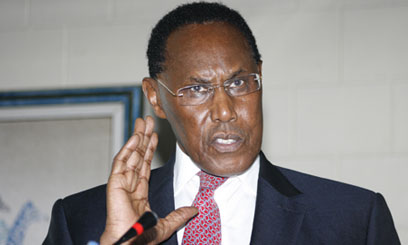Internal Security Minister Professor George Saitoti says Kenya would like to know the exact position of President Sharif Sheikh Ahmed’s fragile government after he issued a conflicting position on Monday.
“The Kenya Government is seeking clarification of the Somali government’s position as it is essential to have a unified approach in dealing with the destabilisation of Somalia by Al Shabaab and its threats to peace and security to Kenya and the region,” Prof Saitoti said in a statement e-mailed to newsrooms.
The Minister said Kenya will in the meantime continue with its operation in the lawless country where its soldiers are fighting off Al Shabaab militia for more than a week.
“In the meantime Kenya in collaboration with IGAD and AU, is continuing with the operation against Al Shabaab,” Prof Saitoti said.
Kenya was taken aback by the Somali President’s surprise comments, because the two countries had agreed to cooperate in fighting off the dreaded gang that is blamed for destabilising peace along the common border and even abducting foreigners.
A day after Kenya sent its troops to the neighbouring country, Foreign Affairs Minister Moses Wetangula led a high powered delegation to meet officials of the Transitional Federal Government (TFG) in Mogadishu where the two countries agreed to cooperate. The meeting took place on October 18.
“Since then, Kenya Government has received conflicting media reports about the Somali government’s comments on the ongoing cooperation,” the statement added.
President Sharif said on Monday he was opposed to Kenya’s week-old military assault against Islamists in the south of his country, as deadly grenade attacks in Nairobi raised fears the rebels were making good on their pledge to retaliate.
While the Islamists had already threatened revenge attacks, the public opposition of the Somali President further raised the stakes over the controversial cross-border incursion.
“Somalia’s government and its people will not allow forces entering its soil without prior agreement,” Sharif told reporters in Mogadishu. “There is only one thing we know about the Kenyan forces, and that is their offer of training to the national army of Somalia.”
Kenya’s unprecedented military incursion, launched after several foreigners were abducted on its soil and taken across the border, stunned the region. Its troops and tanks have pushed some 100 kilometres into southern Somalia, areas controlled by the Al-Qaeda-linked Al Shabaab.
“We have asked neighbouring countries to train our forces with the aim to participate in the liberation and peacemaking effort that is going on in the country,” Sharif said.
“But there are small issues we have discussed with Kenya which we see as unfair,” he added, without elaborating.
Sharif’s weak Western-backed government survives in Mogadishu under the protection of more than 9,000 African Union troops, who have spent four years battling Al Shabaab’s military drive to topple his administration.
His government controls only the war-ravaged capital, while the African Union Mission for Somalia (AMISOM), with troops from Uganda and Burundi, continues to fight bloody battles in Mogadishu’s outskirts.
“AMISOM is in Somalia with an AU mandate and the consent of Somalia’s government,” Sharif said. “There is collaboration with Kenya which is to assist Somalia’s national army, so that our forces can fulfil their duties.”
Kenya accuses Al Shabaab of attacks on its territory and a string of recent kidnappings of foreigners, charges the extremist militants reject.
The Al Shabaab have vowed to launch reprisal raids against Kenya, prompting Nairobi to issue security warnings and announcing it has boosted protection around vulnerable sites.
There were no immediate claims of responsibility for the attacks in Nairobi on Monday – one at a bus stop during rush hour that killed one person and wounded 15, including two seriously, and the other at a pub in the capital that left 14 people injured hours earlier.
Investigators suspected Al Shabaab operatives but could not formally establish the Somali group’s involvement.
“We are dealing with a dangerous group – you know Al-Shabaab have their sympathisers here, and maybe they are the people we are dealing with,” national Police Chief Mathew Iteere said after the pub attack.
The US embassy in Nairobi had earlier warned of attacks possibly targeting foreigners, citing “credible information of an imminent threat of terrorist attacks.”
On Monday, State Department spokeswoman Victoria Nuland said in Washington: “we have been concerned about this,” adding that Secretary of State Hillary Clinton has been worried “particularly about activities of Al-Shabaab.”
Kenyan forces in Somalia have been bogged down by heavy rains, slowing down their advance on Al Shabaab positions despite aerial bombing raids, including on the rebel stronghold port of Kismayu.
Sharif’s comments perhaps echo worries of some Somalis who oppose the Al Shabaab, but who have expressed concern that Kenya’s attack on the rebels may also include an attempt to carve out a buffer zone of control in the south.
Meanwhile France on Monday said it would provide logistical support to transport Kenyan military equipment by air from Nairobi to an airport near the Somali border.
The last time Somalia was invaded by one of its neighbours was in late 2006 when Ethiopia started an occupation that lasted two years and spurred the formation of the Shabaab insurgency.











































